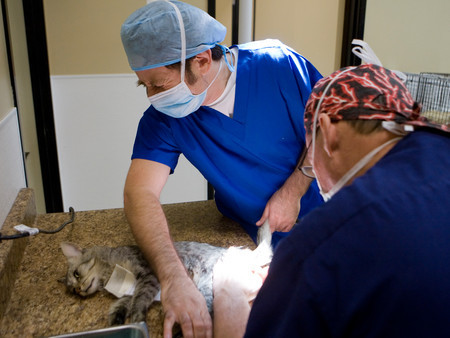Cat neuterer
The scrotum is sliced. A white orb pokes through. It's attached by the spermatic cord. This elastic thread will be stretched beyond what appears to be its snapping point, then snipped and, to prevent bleeding, quickly knotted.
"Umm, the vet tech is supposed to look," says the slicer and snipper, Dr. David Henderson, medical director of the Heaven Can Wait monthly spaying and neutering clinic for feral cats.
I am trained in the metaphorical removal of these anatomical features, thanks to marriage. But this is probably the grossest thing I've ever seen -- after the video of me cleaning pools in a "Borat" mankini. In addition, it induces sympathy pain that actually intensifies with each of the dozen procedures I assist.
I've tackled jobs that take testicles before, but never like this.
"I know, I know," says Michelle Trolson, 41 -- who normally pulls the patient's legs away from the surgical area as Henderson makes his fateful alterations.
I beg Trolson's pardon, but she can't know. Tonight, her dreams will be completely free of giant male tabbies, um, pulling her legs away from the surgical area.
Feral cats are the wild offspring of escaped domestics. According to Heaven Can Wait, approximately half a million roam Clark County, 30,000 of which are euthanized each year.
"This is the humane alternative," Trolson says.
A college dropout from Simi Valley, Calif., Trolson was a stay-at-home mom until her son's enrollment in high school freed up time to reconsider a long-lost dream.
"I've always loved animals," she says, remembering an injured domestic longhair she brought home at 4 years old.
"I told my mom I was gonna fix it," she says.
Mom let the cat stay for a day or two before secretly phoning Animal Control and launching the standard "went to a farm" misinformation campaign.
"I've forgiven her," Trolson says.
Thirty-odd years later, Trolson enrolled in the College of Southern Nevada's two-year veterinary technology program, after which she passed her board exam for the required license. She briefly considered continuing on for her bachelor's and veterinarian degrees. (Vet techs in the valley earn $12 to $20 an hour, about a fifth of what vets earn.) But six years seemed like a long time, and Trolson says she prefers what she does anyway.
"A vet diagnoses, prescribes medication and performs surgery," she says. "Vet techs get to do everything else. And everything else is the part I like to do."
Ferals are trapped and brought to the Heaven Can Wait clinic by animal groups such as the Vegas Valley Humane Society, F.L.O.C.K. (For Love of Cats & Kittens) and Heaven Can Wait. Vet techs inject them with anesthesia, check them for sex organs, then shave and prep them for the voluntary vets. Spaying is the major of the two surgeries, requiring at least 30 minutes in a back room that resembles a cat M*A*S*H. Neutering is performed in the prep area and takes only about three minutes.
Well, it's supposed to anyway. Our next patient is waking up, causing complications. His hind legs begin kung fu-ing against my grip.
"He knows there's something wrong," Henderson says, calling quickly for an anesthesia machine.
Henderson places the mask over kitty's head, then squeezes his testicles to increase breathing. Smaller ferals can't be placed very far under because the injected anesthesia stresses their liver and kidneys more than larger cats.
"Sometimes they don't react the way we think," he says.
Minutes earlier, Henderson told me about the vet he once operated alongside who lost a finger to a cat bite.
"I noticed his glove was flopping around," he said. "I told him he might want to put it on better."
The awkwardness that followed in the operating room prevented Henderson from getting the full story.
"He probably didn't get it taken care of," Henderson said. "Cat mouths have really dangerous bacteria in them, and if it gets into the bone, forget it."
Today's clinic will treat and release 250 felines back onto the street, where they can compete for food with their fellow ferals, but not multiply with them. According to Heaven Can Wait, just one fertile cat can, in nine years, account for 11 million descendants.
"We've got to stop the reproduction so we can stop killing them," Trolson says.
After a five-minute gassing, Kung-Fu Cat finally mellows out. From hereon in, nothing else major happens -- at least from my perspective.
When the patient wakes up, he'll probably disagree.
Watch video of Levitan assistant-neutering at www.lvrj.com/corey. "Fear and Loafing" runs in the Living section on the first Sunday of every month. Levitan's previous columns are posted at fearandloafing.com. If you have a "Fear and Loafing" idea, email clevitan@ reviewjournal.com or call 702-383-0456.
Watch the video




























